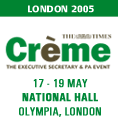
 Schmoozing clients is a time-honoured tradition in business.
From time immemorial, rounds of golf and drinks in the clubhouse
have been part and parcel of maintaining good relationships with
existing or potential clients. Lunches, receptions, invitations
to Wimbledon or the FA Cup Final have all abounded, along with
numerous "goodie bags" at the end of the day.
Schmoozing clients is a time-honoured tradition in business.
From time immemorial, rounds of golf and drinks in the clubhouse
have been part and parcel of maintaining good relationships with
existing or potential clients. Lunches, receptions, invitations
to Wimbledon or the FA Cup Final have all abounded, along with
numerous "goodie bags" at the end of the day.
The public and voluntary sectors, however, need to play this part of the business game slightly differently. The ethics governing business behaviour, not to mention the budgets available for "sweeteners" in the first place, can be very different from those in the private sector.
"Clients" can mean something very different to those in the public and voluntary sector. In the public sector, your clients are usually the people to whom you offer a service that is paid for from public funds. But public sector bodies can and do bid for contracts, especially after the contracting-out of many local authority services. The original in-house team can find itself having to go head-to-head with external commercial enterprises to retain the work previously given to it automatically. This is where the playing field can develop a very lumpy appearance.
Commercial companies are answerable to their shareholders whereas public sector teams often have a different type of behavioural standard to which they are expected to conform. Whether inducements are offered and, if they are, what form they take, can make all the difference in the bidding process. While chairing a conference on procurement recently, ECT Group's Stephen Sears put it like this: "Fair competition is a bit of a misnomer. There's only competition really".
I am not claiming that all private sector companies engage in skulduggery and open bribery in order to win contracts. Neither do I claim that the public and social enterprise sectors don't try to gain the competitive edge. It isn't a perfect world in any of the sectors.
But what public and voluntary sector companies do need to do is to work in different ways with client organisations. When an organisation has a gifts register where presents from grateful individuals to the organisation costing as little as £7.99 need to be listed, then a different approach to working with client groups needs to be found. Here are some suggestions:
- Invest heavily in the working relationship
Ideally, we should all be doing this all the time. The truth is we don't, but paying special attention to the working relationship can pay dividends. If it isn't a contract that an organisation is aiming for but a continuation or increase in funding, then maintaining close relationships with stakeholders can bring rewards. Ensuring that influential people in the client or patron group think well of the organisation and are prepared to champion it, is a very worthwhile investment. Making sure that they know about and understand the particular achievements and challenges faced by your organisation or department can literally be money in the bank.
- Prizes and honours
Obviously, institutions cannot hand out honorary positions or prizes as though they were Smarties. Recipients have to be genuinely worthy of the honour and to have contributed original thinking or many years of work to the field in question. It is a rare person, though, who doesn't want public acknowledgement and recognition of their contribution, and something a little ritzier than "Employee of the Month". If your organisation has Special Advisor or Consultant posts which require some work during the year and mean that someone's name appears on the Editorial Board or on publications, it can be a mutually satisfying part of the relationship you build with your client.
- Speaking engagements
If you have a conference coming up, could your client contribute with a presentation? Could they be a keynote speaker? There is no point in approaching them with these offers if you don't know whether they are good at public speaking (or if you know they're definitely not). That will be humiliating for them and damaging to you as an organisation. However, even if they are a little rough round the edges, it is a great honour to be asked to speak at a gathering of the great and the good in your particular field.
Could you begin a series of, say, quarterly seminars where you can invite key people for your organisation to speak on a particular topic? This is not only about your organisation developing closer working links with them, but also allowing them to gain exposure as an industry heavyweight and boost their CV.
- Collaborative working
There are two main strands to this - development of products, systems and theories in tandem with your client, or secondment of personnel from one organisation to another. The latter is a time-honoured way of major corporations sharing their expertise with the voluntary sector. But sharing of experience and ideas is a two-way street.
Could you develop a programme of shorter and longer secondments for key personnel between your organisation and your clients? Sometimes money and contracts aren't the only or major points of a working relationship. Sometimes it's having help with managing change within the organisation or developing new HR systems that can be of the most use.
The client organisation doesn't only gain additional expertise for its senior managers, it learns more about your organisation at the same time which means it's easier to develop internal champions with your funders, for example. They will be intrinsically more sympathetic to the hurdles your organisation faces if they have someone in-house who has walked the walk with you.
Whether you approach this subject from the private, public or voluntary sector, I believe that the easiest thing to lose is your reputation. Acting in an unethical manner can lose your organisation respect and standing for many years to come.
A cup of tea and some custard creams for a meeting with clients, fine. A golf bag to take away? We need to think again.









